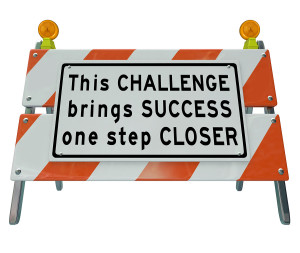My work colleague bumped into another person at work when she was leaving the office we share and screamed when they collided. When my colleague came back she mentioned how when things startle her it makes her feel better to make a loud noise. She then reminded me of the story I told her about the fire extinguisher.
How To Remain Calm When Your Toaster (Or Anything Else) Is On Fire
How to Keep Your Self-Talk Positive
 Science has shown that we have anywhere from 30,000 to 70,000 thoughts a day, which means we are bombarded with self-talk every minute we’re awake. How do we allow ourselves to remain positive when there’s so much coming at us?
Science has shown that we have anywhere from 30,000 to 70,000 thoughts a day, which means we are bombarded with self-talk every minute we’re awake. How do we allow ourselves to remain positive when there’s so much coming at us?
Showing Your True Self to Stand Out
 I’ve been working on my resume since losing my job. One issue I had with it, is that it didn’t seem to represent who I was. I’ve been thinking about injecting more personality into it, and in fact, started doing that with my cover letter. I am more than a list of job responsibilities.
I’ve been working on my resume since losing my job. One issue I had with it, is that it didn’t seem to represent who I was. I’ve been thinking about injecting more personality into it, and in fact, started doing that with my cover letter. I am more than a list of job responsibilities.
Five Lessons I Learned When My Job Was Eliminated
 Last Thursday was like any other; I got up, went to work, and started my day. Mid-morning, my boss asked to see me. I walked into his office and when I turned the corner I noticed our HR Manager was there and my eyes got wide. I took a seat and was told that because of the way the business was going and job consolidation, he had eliminated my job. HR walked me through some paperwork, I packed my belongings, and was escorted out the door. I got in my car and drove home. I was in shock.
Last Thursday was like any other; I got up, went to work, and started my day. Mid-morning, my boss asked to see me. I walked into his office and when I turned the corner I noticed our HR Manager was there and my eyes got wide. I took a seat and was told that because of the way the business was going and job consolidation, he had eliminated my job. HR walked me through some paperwork, I packed my belongings, and was escorted out the door. I got in my car and drove home. I was in shock.
What Playing the Bluebird Café Taught Me About Being the Best
 In 1998, I went to play the famous Bluebird Café in Nashville, TN. If you’ve never been there, the atmosphere is intimate. It’s dark and cozy, and it only holds about 90 people. Many stars were discovered there; Garth Brooks, Kenny Chesney, and Keith Urban to name a few. At the time, I thought about moving to Nashville and making it as a songwriter. The Bluebird Café was the place to go and judge where I stood against every other aspiring songwriter. It still is.
In 1998, I went to play the famous Bluebird Café in Nashville, TN. If you’ve never been there, the atmosphere is intimate. It’s dark and cozy, and it only holds about 90 people. Many stars were discovered there; Garth Brooks, Kenny Chesney, and Keith Urban to name a few. At the time, I thought about moving to Nashville and making it as a songwriter. The Bluebird Café was the place to go and judge where I stood against every other aspiring songwriter. It still is.Gaining Confidence and Success Through Visualization
 We are more confident when we are in comfortable situations. When we’re surrounded by people and places we know, it gives us a sense of security. We feel relaxed, loose. We perform better under these conditions.
We are more confident when we are in comfortable situations. When we’re surrounded by people and places we know, it gives us a sense of security. We feel relaxed, loose. We perform better under these conditions.A Lesson on Permission
 During my senior year of high school I tried to start a school newspaper. I found out from my English teacher, Mr. Crump, that there hadn’t been one for a number of years after a student wrote some negative things about a teacher. I thought it was a shame that we didn’t have a school paper. Mr. Crump said that if I wanted to be the editor he’d support me in bringing back a student newspaper; he would act as an adviser. This was my chance to start something special and leave my mark in the world; at least my mark on Whitnall High School.
During my senior year of high school I tried to start a school newspaper. I found out from my English teacher, Mr. Crump, that there hadn’t been one for a number of years after a student wrote some negative things about a teacher. I thought it was a shame that we didn’t have a school paper. Mr. Crump said that if I wanted to be the editor he’d support me in bringing back a student newspaper; he would act as an adviser. This was my chance to start something special and leave my mark in the world; at least my mark on Whitnall High School.
Watch This!
A number of summers ago my wife and I went to Minooka Park, in the suburbs of Milwaukee, so we could cool off in the pond. That day we met a boy who made an impression on us that will last a lifetime.


Follow Me!